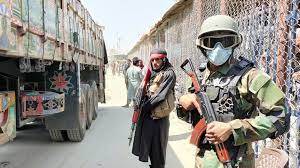
The tensions and conflicts between the Afghan Taliban and Pakistan have a complex history that has its roots in the aftermath of the 9/11 attacks. Pakistan faced a critical choice at that time: whether to align itself with the United States and its global coalition or follow in the footsteps of Mullah Omar's Taliban regime and reject international pressure. General Pervez Musharraf chose the former path, committing Pakistan to join the U.S.-led alliance.
Initially, this alliance appeared to be beneficial for Pakistan. The country received financial assistance, land routes, and drone bases in exchange for its support. Pakistan even arrested and handed over key Taliban leaders to the United States, such as Mullah Abdul Salam Zaeef and Dr. Ghirat Bhir, to demonstrate its commitment.
However, behind the scenes, Pakistan continued to support the Afghan Taliban. This dual policy led to contradictions: publicly, Pakistan was part of the U.S. alliance, while covertly, it nurtured the Taliban. This duplicity allowed the Pakistani Taliban (TTP) to thrive within Pakistan's border regions, as Pakistan's military focused on its covert ties with the Afghan Taliban.
Furthermore, Pakistani politicians and leaders, including those in the political party MMA and Imran Khan, advocated in favor of the Afghan Taliban while opposing U.S. actions, such as drone strikes. This created a narrative that distinguished between the "good" Afghan Taliban and the "bad" Pakistani Taliban, despite their shared origins.
The United States consistently accused Pakistan of playing a double game, but Pakistan did not change its approach. Even when Afghanistan, particularly the governments of Hamid Karzai and Ashraf Ghani, implored Pakistan to stop providing sanctuary to their enemies (the Taliban), Pakistan remained unyielding, despite suffering significant casualties in its own border regions.
A notable sentiment emerged among some in Pakistan that they had defeated two superpowers with American weaponry: first, the Soviet Union during the Afghan-Soviet War and now the United States during the War on Terror.
The United States employed various tactics, including luring and pressuring Pakistan, but when it became clear that these strategies were ineffective and that the Taliban's resistance was not diminishing, the U.S. decided to withdraw from Afghanistan. The Qatar Agreement formalized this withdrawal and handed Afghanistan back to the Taliban.
Former U.S. National Security Advisor John Bolton revealed that President Trump questioned whether the United States would face the same threat as 9/11 if it left Afghanistan, and he received the answer that it would not. This led to the decision to withdraw, leaving behind significant quantities of advanced weaponry that fell into the hands of groups like the TTP.
The victory of the Afghan Taliban was also celebrated in Pakistan, with leaders like Prime Minister Imran Khan hailing it as the breaking of the "chains of slavery." Despite concerns from defense analysts and retired generals, Pakistan did not change its stance.
In the aftermath of the U.S. withdrawal, Pakistan's relations with the Afghan Taliban became complicated. The new military leadership demanded action against the TTP, but the Afghan Taliban suggested that Pakistan negotiate with them instead. This divergence in interests heightened suspicions that the TTP had the support of the Afghan Taliban, potentially aiming to coerce Pakistan into compliance.
As a result, tensions have risen between Pakistan and the Afghan Taliban, with both sides reportedly planning drastic measures against each other. There is a growing fear that these tensions could escalate into a full-blown conflict, which would be detrimental to both parties.
In this challenging situation, it is essential for both sides to consider their constraints and seek a peaceful resolution. However, the prospect of such a resolution seems to be diminishing. It raises questions about the moral responsibility of Pakistan's generals, religious leaders, political figures, and intellectuals who supported the Taliban over the years. Should they not actively engage in efforts to mediate between the Afghan Taliban and Pakistan or at least acknowledge the consequences of their past policies and analyses?
In conclusion, the history of Pakistan's relationship with the Afghan Taliban is marked by complex and contradictory decisions, and the current tensions between the two parties raise concerns about the potential for further conflict. It is imperative for all stakeholders to prioritize peaceful dialogue and resolution in the interests of regional stability and security.

